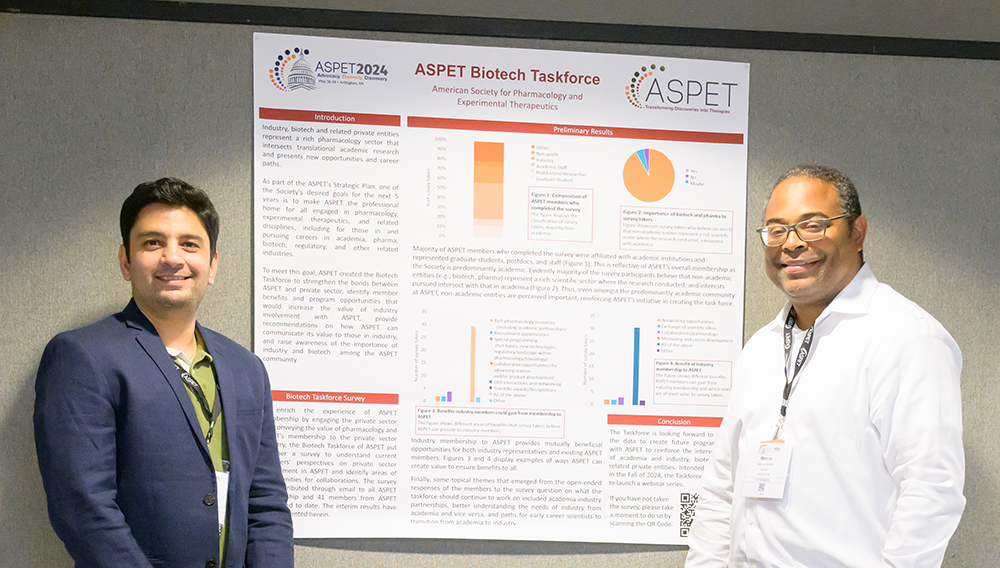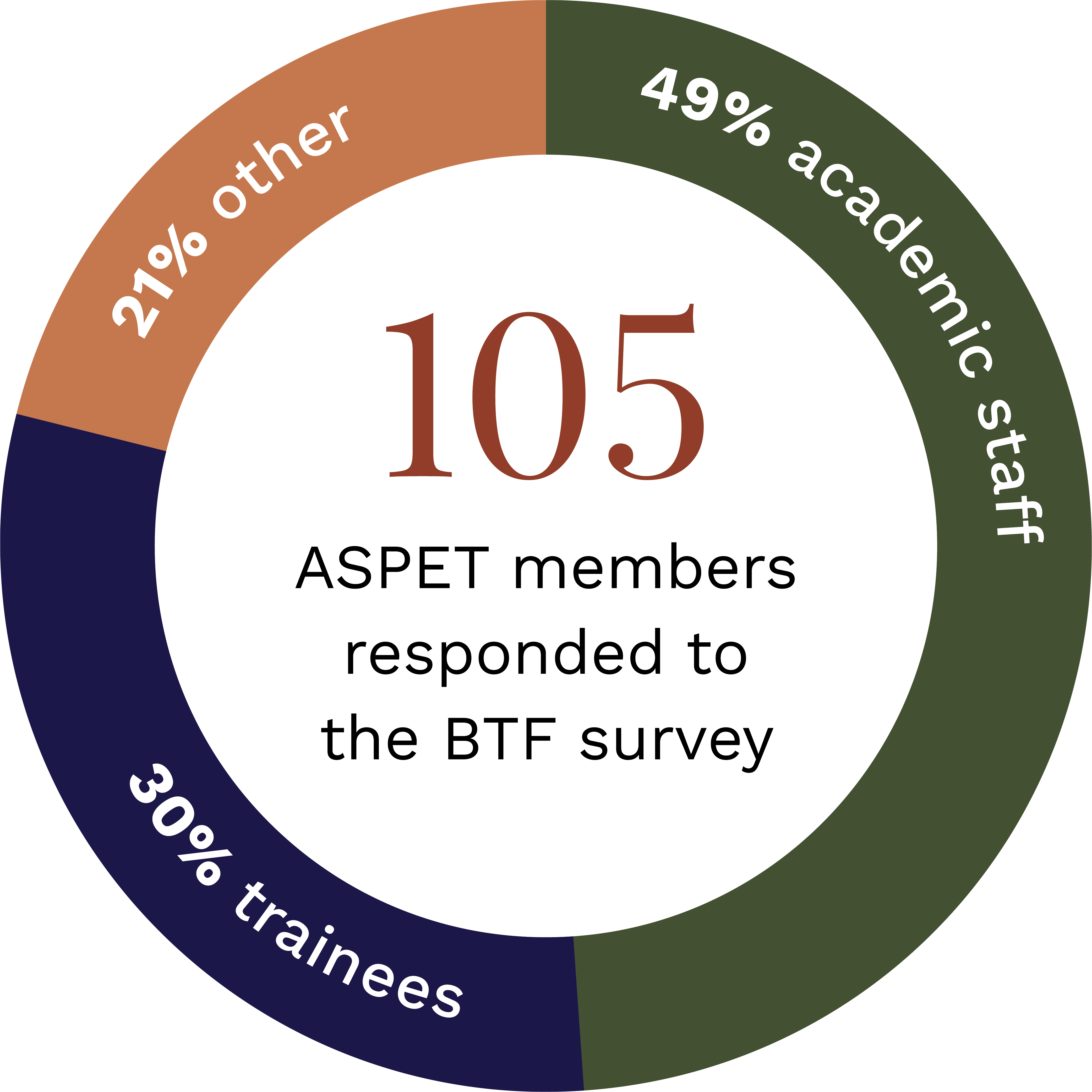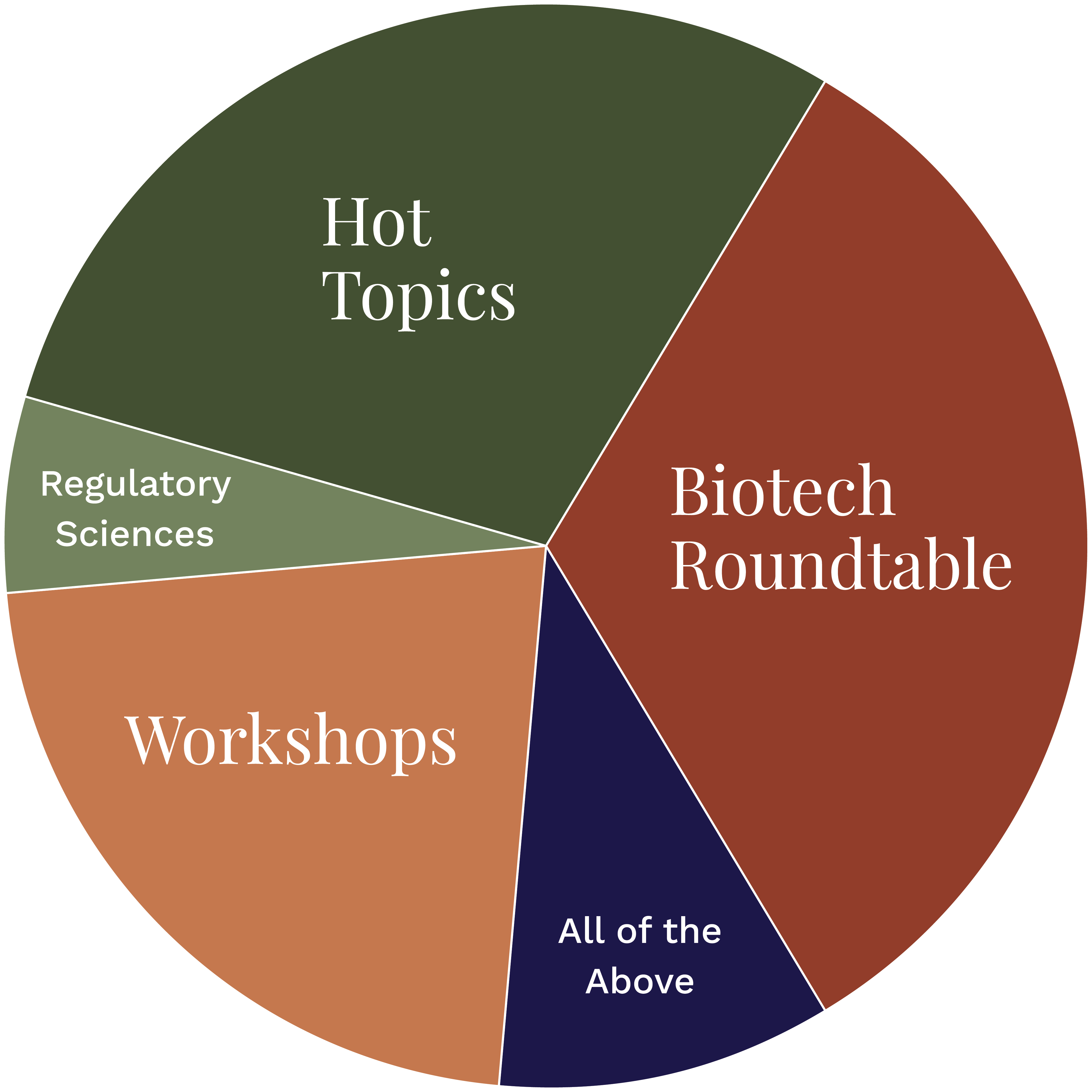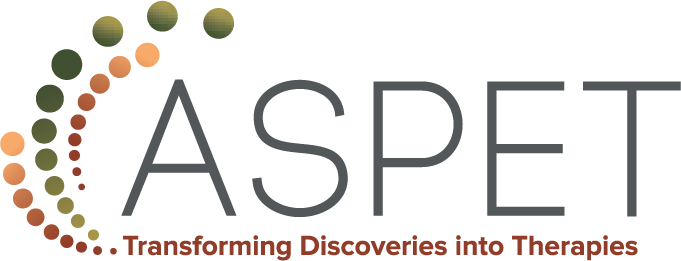ASPET Members Support Opportunities for Biotechnology Representation in New Biotech Survey

The American Society for Pharmacology and Experimental Therapeutics’ (ASPET) Biotech Taskforce (BTF) was established in October 2023 to focus on increasing private sector participation within the Society.
BTF is charged with devising strategies to improve or reverse this trend. In addition, the BTF would play a pivotal role in bridging the gap between academia, industry, and government sectors. By fostering collaborations and facilitating the exchange of scientific ideas, the BTF will further enhance the integration of cutting-edge biotechnological advancements together with academic pharmacological research.
In alignment with ASPET’s strategic goals, the taskforce is charged with identifying member benefits and program opportunities that would increase the value of industry involvement with ASPET, both at the individual and organizational levels, which include:
- Increasing mentorship and professional development opportunities to foster a community of diverse career paths.
- Facilitating connections for those interested in exploring careers in the private sector.
- Assessing the interests and incentives of current members and evaluating their views on private sector science to support appropriate opportunities.
- Enabling inclusiveness to broaden the audience in the pharmacology discipline.
To raise awareness among ASPET’s predominantly academic community about the significant contributions of biotech, pharma, and related private entities to pharmacology and understanding the current needs of ASPET members, the BTF conducted a comprehensive survey. Launched in April 2024, the survey assessed the views, attitudes, interests, and expectations of ASPET members toward the private sector by including questions on the general perspective of the ASPET community on scientific research conducted in private sectors, the value private sectors bring to ASPET, areas of programming that the BTF could contribute, and how ASPET can benefit with being inclusive for private sector memberships.
By the close date of July 15, 2024, a total of 105 ASPET members responded, including 49% academic staff, 30% trainees (undergraduates, graduate students, postdocs), and 21% government / nonprofit / industry / other.

The survey results overwhelmingly reflected positive views on private-sector science. A large majority of respondents (>70%) indicated that industry members could add significant value to ASPET through networking, exchange of scientific ideas, collaborations/partnerships, and mentoring and career development.
Specific questions asked in the survey were:
What is the general perspective of the ASPET community on scientific research conducted in private sectors?
What value do industry members bring to ASPET members?
What areas of programming can the BTF contribute to enhance the quality of ASPET’s annual program?
How can ASPET benefit industry members?
The survey also provided space for additional comments.
The responses were more evenly distributed among the choices offered for programming to be led by the BTF, which included:

- Biotech Roundtable: 33% of respondents suggested incorporating an industry biotech roundtable or fireside discussion into the annual program.
- Hot Topics (New Technologies): 29% recommended including sessions on new technologies and innovations in the private sector.
- Regulatory Sciences: 6% suggested that regulatory sciences and government affairs should be a focus.
- Informational and Hands-on Workshops: 22% emphasized the need for workshops on pharmacological applications and career development activities.
- All of the Above: 10% of respondents believed that all these areas should be included in the annual program.
Respondents highlighted several key areas where members from the private sector could potentially contribute to ASPET:
Networking: Industry members facilitate valuable connections within the pharmacology community.
Exchange of Scientific Ideas: Industry participation enriches the scientific discourse with diverse perspectives.
Collaborations/Partnerships: Industry-academic collaborations drive innovation and research advancements.
Mentoring and Career Development: Industry professionals provide mentorship and career guidance to trainees and
early-career researchers.
In addition, the value returned to industry by their participation in ASPET may include:
Access to Pharmacology Resources: Industry members benefit from ASPET’s extensive pharmacology resources.
Recruitment Opportunities: ASPET provides a platform for recruiting top talent in the field.
Special Programming: Industry members gain access to specialized programming tailored to their interests.
Collaborative Opportunities: ASPET fosters collaborations between industry and academic researchers.
CRO/Vendor Interactions/Networking: ASPET offers a platform where industry members can network with Contract Research Organizations (CROs) and vendors.
Science Awards/Recognitions: ASPET recognizes and rewards scientific excellence, which is valued by private-sector organizations.
In addition to the survey questions, several respondents provided insightful comments that were similarly themed and notable:
Collaboration with Academic Scientists: Scientists experienced in the private sector could work with academic scientists to expand ASPET’s educational and research activities, such as in the area of Pharmacoeconomics.
Inclusion in Awards and Committees: Industry scientists should be more included in awards, positions on executive committees, speaking opportunities,
and opportunities for publishing science and opinions.Support for Spinout Companies: Private sector organizations can be a source of support to academic pharmacologists with spinout companies by providing financial, legal, and technical assistance.
Interactions with IP/Patent Law Societies: Facilitating interactions between ASPET and intellectual property/patent law societies and firms could be beneficial.
The BTF is motivated to achieve its charge within the framework of ASPET’s Strategic Plan and in alignment with the outcomes of this survey. The overarching goal of the BTF is to establish a home for the private sector within ASPET and nurture its development.


